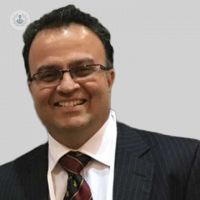Bariatric surgery unveiled: A comprehensive guide
Written by:In his latest online article, Mr Vittal Rao gives us his insights into bariatric surgery. He talks about the different types, risks and benefits, who makes a good candidate, recovery process, how much weight you can expect to lose, lifestyle changes, age requirement, psychological requirement and medical conditions that could exclude someone from surgery.

What are the different types of bariatric surgery?
When considering weight loss or bariatric surgery, there is a diverse array of options available. The most frequently performed procedures include the insertion of a gastric balloon into the stomach, sleeve gastrectomy, and gastric bypass. These procedures vary in their degree of invasiveness and whether they are reversible.
What are the risks and benefits of bariatric surgery?
As with any surgical intervention, weight loss or bariatric surgery carries both risks and benefits. The key to ensuring success lies in careful patient selection, tailoring the type of surgery based on various factors. The primary advantage of these procedures is evident in their ability to promote weight loss, leading to the improvement or complete resolution of associated health issues, including diabetes, high blood pressure, high cholesterol levels, sleep apnoea, and fatty liver. Moreover, they serve as preventive measures against the development of these conditions in individuals who haven't yet experienced them, as well as reduce the risk of adverse events such as strokes and heart attacks.
Weight loss surgery also demonstrates a preventive effect against various cancers, including those affecting the bowel, womb, ovary, liver, pancreas, and breast, among others. Turning to the associated risks, they can be categorised into short-term and long-term. Immediate risks involve potential complications related to the surgery, such as bleeding, leaks, or bowel blockages. However, advancements in surgical techniques have significantly minimised these risks. According to the nationwide registry known as the NBSR, weight loss surgery stands out as one of the safest procedures, with a mere five percent risk of complications and less than one percent risk of patients succumbing to the surgery—making it even safer than gallbladder surgery, joint replacement, or hysterectomy.
Long-term risks are often tied to inadequate patient selection and non-compliance with post-surgery recommendations, including dietary and lifestyle changes, as well as the intake of necessary vitamins and supplements.
Who is a good candidate for bariatric surgery?
An ideal candidate for weight loss surgery is someone who has thoroughly explored the option and is unequivocally convinced that it is the right choice for them. It's crucial to distinguish weight loss surgery from cosmetic procedures like a tummy tuck – it's more of a tool that empowers patients to facilitate weight loss rather than a mere aesthetic enhancement.
To maximise the benefits of the surgery, a profound understanding of life post-operation is imperative. Without it, patients may find it challenging to adapt to the necessary changes for the surgery to yield optimal results. Primarily, individuals who are overweight and grapple with significant health issues stand to gain the most. Following weight loss surgery, many associated health problems, including diabetes, high blood pressure, high cholesterol levels, sleep apnoea, and fatty liver, either improve significantly or vanish altogether. Moreover, there's a notable reduction in the risk of death from stroke and heart attacks, along with the added benefit of cancer prevention.
What is the recovery process after the bariatric surgery?
Typically, the majority of our patients are able to return home within a day or two following weight loss surgery. We strongly advise a two-week period of limited physical activity to allow for a smooth recovery. The primary challenge lies in adopting dietary modifications, with many patients transitioning to a liquid diet.
Following a gastric balloon procedure, patients can anticipate a weight loss of approximately two to three stones within six months. A sleeve gastrectomy typically yields a weight loss of four to six stones over a two-year period, while a gastric bypass can result in a weight loss of six to eight stones within the same timeframe. Sustaining this weight loss is contingent upon maintaining compliance with a healthy diet and lifestyle. Straying from these guidelines increases the risk of regaining weight.
What lifestyle changes do you need to make of the bariatric surgery to maintain your weight loss?
Post-surgery, it's crucial to maintain a reasonable level of physical activity and adhere to a well-rounded, healthy diet that includes a balanced mix of proteins, carbohydrates, and fats. Many diets tend to be carb-heavy and protein-light, so rebalancing is essential to mitigate the risk of malnutrition post-surgery.
Regular intake of vitamin and mineral supplements is also imperative for sustaining energy levels. It's advised to steer clear of smoking and excessive alcohol consumption, as these habits elevate the risk of developing ulcers, potentially leading to life-threatening complications
What would be the age requirement for surgery?
The surgical procedure is typically considered routine for patients aged 18 and above, extending up to 17 years of age. However, for individuals beyond this age range, a meticulous evaluation of both risks and benefits is essential. Specialised input is often required to determine their suitability for the surgery.
What are the psychological requirements for bariatric surgery?
Thorough assessment is crucial for patients with substantial mental health concerns before proceeding with weight loss surgery. This includes individuals with a history of self-harm, eating disorders, substance abuse, and mental health conditions like bipolar disorder. A comprehensive psychological evaluation is necessary before considering weight loss surgery for these patients.
What are the medical conditions that may disqualify someone from bariatric surgery?
I wouldn't assert that any specific medical condition automatically disqualifies someone from weight loss surgery, as the primary goal is to enhance overall health. However, individuals should not have severe medical conditions that would render them unfit for a general anaesthetic, such as significant heart or breathing problems.
For instance, individuals reliant on home oxygen with limited exercise tolerance would not be suitable candidates for surgery, as they may not withstand a general anaesthetic. Additionally, certain medical conditions like severe inflammatory bowel disease or a history of multiple abdominal operations with bowel removal can restrict the available surgical options for these patients.
Mr Vittal Rao is an esteemed surgeon with over 20 years of experience. You can schedule an appointment with Mr Rao on his Top Doctors profile


